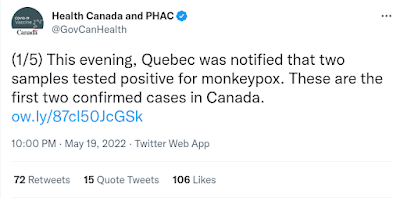Overnight PHAC confirmed that two of the suspected Monkeypox infections being investigated in Montreal have tested positive for the virus - with more expected - bringing the number of countries reporting confirmed cases to 10 (Spain, Portugal & the UK still have the majority of the roughly 60 confirmed cases).
While public health officials continue to stress that the overall risk to the general public is low, this is an unprecedented multi-national outbreak - and with new reports coming in by the hour - no one is quite sure how widespread the virus has become.
Public Health Agency of Canada Confirms 2 cases of Monkeypox
From: Public Health Agency of Canada
Statement
May 19, 2022 | Ottawa, ON | Public Health Agency of Canada
The Public Health Agency of Canada (PHAC) is working with the United States Centers for Disease Control and Prevention, and public health authorities in the province of Quebec to investigate potential exposure and contacts of a case of monkeypox recently identified in the United States (U.S.). The U.S. citizen had recently travelled to Canada from the U.S. The individual travelled by private transportation and may have been infected before or during his visit to Montreal, Quebec.
As part of the ongoing investigation, health partners have identified individuals in Canada who have signs and symptoms which could be consistent with monkeypox infection. The National Microbiology Laboratory (NML) is undertaking additional testing to confirm or rule out a diagnosis of monkeypox for these individuals. Tonight, the Province of Quebec was notified that two samples received by the NML have tested positive for monkeypox. These are the first two cases confirmed in Canada.
Monkeypox is a zoonotic infectious disease found in parts of central and West Africa that result in occasional human infections usually associated with exposure to infected animals or contaminated materials. Limited cases have been identified in other regions in the past, including the United Kingdom, United States, Israel and Singapore, but never before in Canada. For the recent international cases, it is not yet certain how the individuals were exposed to monkeypox virus.
Person to person spread of monkeypox is uncommon. However, when spread does occur between people the mode of transmission is through close contact with an infected individual, such as through direct contact with their body fluids, respiratory droplets, or monkeypox sores, or by sharing clothing, bedding or common items that have been contaminated with the infected person's fluids or sores. As with many other diseases spread through close contact, people can lower their risk by maintaining physical distance, frequent hand and respiratory hygiene including masking.
People should be aware of the symptoms of monkeypox and report any concerns to their health care provider. Signs and symptoms of monkeypox can typically include fever, headache, muscle aches, exhaustion, and swollen lymph nodes, and a rash that often appears within a few days after symptoms such as fever develop.
PHAC has alerted public health authorities to work with health care providers to look for patients who have signs or symptoms consistent with monkeypox, regardless of whether they have reported travel or have specific risk factors for monkeypox.
This is an evolving and ongoing investigation, both in Canada and around the world. More information is needed to assess if there are increased health risks to people in Canada. PHAC will continue to provide updates to the public as new information becomes available.
Whether anything has changed in that regard, is something we will be quite interested to learn.
Being a DNA virus, it is less prone to rapid mutation than RNA viruses (like COVID, and Influenza), but all viruses evolve. In the 2014 EID Journal article Genomic Variability of Monkeypox Virus among Humans, Democratic Republic of the Congo the authors cautioned:
Small genetic changes could favor adaptation to a human host, and this potential is greatest for pathogens with moderate transmission rates (such as MPXV) (40). The ability to spread rapidly and efficiently from human to human could enhance spread by travelers to new regions.The more sequential jumps from human-to-human a virus makes, the more likely we are to see adaptive changes in the virus, making the rapid suppression of this outbreak a priority.
According to the CDC: Currently, there is no proven, safe treatment for monkeypox virus infection. For purposes of controlling a monkeypox outbreak in the United States, smallpox vaccine, antivirals, and vaccinia immune globulin (VIG) can be used.
The world's supply of smallpox vaccine is extremely limited, and the older replicating smallpox vaccine carried some serious health risks. In 2019, we looked at a new FDA approved live, Non-replicating Vaccine to Prevent Smallpox & Monkeypox which should provide a safer, and more readily available, medical countermeasure.
While there is still much uncertainty over how serious this outbreak will become, it is a reminder that nature's laboratory is open 24/7 - and ready for them or not - new biological threats will continue to emerge to challenge us.
